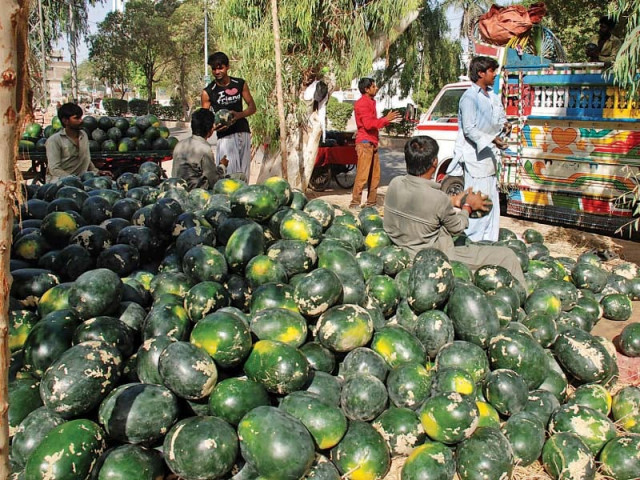Be wary of what you eat
Research unveils dangerous effects of pesticides on farmers, end-users and environment

According to a paper by Ashraf Mallah, the use of pesticides has harmful effects on not just the farmers but also the food consumers. He counted a range of vegetables and fruits that contain varying amounts of pesticide residues by the time they reach the market. PHOTO: SHAHID ALI/EXPRESS
The use of pesticides not only has a detrimental effect on farmers who apply it but also those who use the end product as well as the environment.
A paper on pesticides and their effects was read out during the two-day national conference held at Mehran University of Engineering and Technology's Institute of Environmental Engineering and Management, which concluded on Thursday. It revealed how pesticides expose humans to toxins and highlighted its adverse effects on human and animal health, and the environment.
UoP students complain of falling sick after eating canteen food
The study's author, Lakhra Coal Development Corporation mines manager Ashraf Mallah, said the most serious health hazard is to farmers owing to their direct exposure to chemicals. "Depending on the level of exposure, the effects may include skin irritation, birth defects, genetic changes, blood and nerve disorders, tumors, endocrine disruption and cancer," he said.
Although health risks for farmers are higher, food consumers are also vulnerable. For example, around half of some 36 chemicals sprayed on apples and pears are neurotoxins, which can cause brain damage.
Mallah went on to count a range of vegetables and fruits that contain varying amounts of pesticide residues by the time they reach the market. He said the use of hormones, antibiotics and other drugs has become a standard in animal husbandry. "All of these accumulate in the livestock's meat and get passed on to the consumers," he said, adding that milk, cheese and butter are also not spared from the adverse effect of chemicals.
"Cotton is sprayed with the largest amount of pesticides and sadly, farmers are neither educated about its dangers nor provided any safety gear," he lamented, concluding that as a result, women and children, who mostly engage in cotton picking, become easy prey.
Insecticides, a type of pesticide specifically used to kill insects, are available in liquid, solid and gas forms. Mallah argued that most insecticides are not pest-specific, explaining that they end up killing or harming other life forms, including humans.
More than 300 sick in Japan after eating contaminated food: Reports
In Pakistan, particularly in Sindh, the researcher has identified poor spraying techniques and excessive use of chemicals as reasons for increased resistance of pests in addition to higher levels of contamination. "Over 500 species of pests have developed resistance to insecticides - this requires excessive use of chemicals to kill the bugs," he said, citing a study.
Pesticides enter fresh water channels by drifting outside the sprayed field and leaching in the soil, among other ways. Rainfall also transports the chemical from agricultural fields to water bodies. This contaminated water is used by humans, livestock as well as the flora and fauna of the area, he revealed.
Describing their harmful effects on soil, he said pesticides degenerate soil quality, cause water retention, damage biodiversity and decrease land fertility. Pesticides in the air can rise to very high altitudes and travel long distances.
An overnight cessation in the use of pesticides appears impossible to the researcher, who believes sensitising farmers about damage to humans and the soil can help mitigate its harmful effects. He also recommended research to find less damaging alternatives to pesticides as well as strict enforcement of regulations on use of chemicals.
Eating veggies doesn't equal avoiding junk food
Recommendations
Speakers emphasised on adhering to stricter environmental protection standards for sustainable development. "For future generations, we have to create effective policies and adopt an environment-friendly attitude," said MUET vice-chancellor Dr Muhammad Aslam Uqaili at the conference.
The conference recommended regulating the use of pesticides, improving municipal solid waste recycling and disposal systems, addressing disaster-risk management, ensure proper handling of hazardous chemicals and reducing noise pollution, among other suggestions.
Experts from varsities across the country read over 30 research papers at the conference.
Published in The Express Tribune, April 16th, 2016.



















COMMENTS
Comments are moderated and generally will be posted if they are on-topic and not abusive.
For more information, please see our Comments FAQ